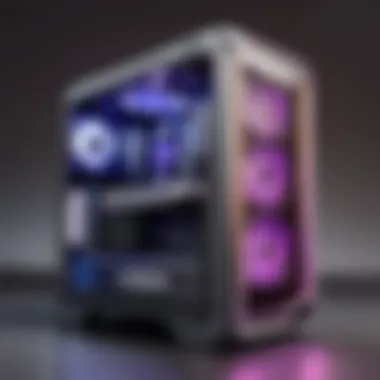Elevate Your Gaming Experience: Boost PC Performance for High FPS


Hardware Optimization
To embark on the journey of enhancing your PC for high FPS gaming, it's crucial to delve into the realm of hardware optimization. Upgrading key components like the graphics card 🎮, CPU, RAM 🖲️, and storage 🔍 can significantly elevate your gaming experience. Ensuring that your PC meets the recommended hardware specifications for the games you aim to play is paramount. Dive deep into the intricacies of hardware upgrades to unleash the full potential of your gaming rig.
Graphics Card
The graphics card is the powerhouse behind rendering complex graphics in high-definition games. Investing in a robust graphics card with ample VRAM and GPU cores can enhance FPS output and overall visual fidelity. Explore the latest models from renowned manufacturers such as NVIDIA and AMD for cutting-edge graphics performance. Optimizing driver settings and ensuring proper ventilation and cooling for your graphics card are imperative steps to boost gaming performance.
CPU and RAM
The central processing unit (CPU) and random-access memory (RAM) are pivotal in delivering seamless gameplay without lags or stutters. Upgrading to a multi-core processor with high clock speeds can bolster game performance, especially in CPU-intensive titles. Pairing the CPU with sufficient RAM capacity is essential to prevent bottlenecks and ensure smooth multitasking during gaming sessions. Opt for high-speed DDR4 or DDR5 RAM modules to maximize data transfer rates and reduce loading times.
Storage Solutions
Storage plays a vital role in accelerating game loading times and minimizing in-game hitches. Consider upgrading to a solid-state drive (SSD) for faster boot times and improved texture streaming in games. An SSD with NVMe technology offers superior read and write speeds, ideal for reducing loading screens and optimizing overall game performance. Complementing the SSD with a high-capacity hard disk drive (HDD) can provide ample storage space for large game libraries without compromising speed.
Software Tweaks and Performance Enhancers
While hardware upgrades lay the foundation for a high-performance gaming setup, software tweaks and performance enhancers play a pivotal role in fine-tuning your PC for optimal FPS output. Delve into the realm of software optimization and performance-enhancing tools to unlock the full potential of your gaming rig.
Operating System Optimization
Optimizing your operating system (OS) for gaming involves disabling unnecessary background processes, updating system drivers, and configuring power settings for maximum performance. Explore system utilities and performance monitoring tools to identify resource-intensive applications and optimize system resources for gaming. Tweaking visual settings, such as adjusting resolution and texture quality, can also impact FPS output and visual aesthetics in games.
Overclocking and Monitoring Tools
For enthusiasts seeking to push their hardware to the limit, overclocking presents an avenue to boost CPU and GPU performance beyond factory settings. Engage with caution and research proper overclocking techniques to prevent hardware damage. Utilize monitoring tools like MSI Afterburner and CPU-Z to track hardware metrics, temperatures, and clock speeds during gameplay. Monitoring system metrics can help optimize hardware settings for enhanced gaming performance and stability.


Game Optimization Utilities
Game optimization utilities like Razer Cortex and NVIDIA GeForce Experience offer integrated tools to streamline game performance and enhance FPS output. Leveraging optimization software can automate game settings for optimal performance and compatibility with your PC hardware. explore manual tweaking of in-game graphical settings to find the perfect balance between visual quality and FPS stability. Experimenting with resolution scaling, anti-aliasing, and shadow details can yield significant improvements in gaming performance and visual fidelity.
Network Optimization and Latency Reduction
To achieve high FPS gaming prowess, optimizing your network connection and reducing latency are crucial steps in ensuring a smooth and responsive gaming experience. Explore network optimization techniques and latency reduction strategies to minimize disruptions and elevate your gameplay to competitive levels.
Internet Connectivity
Stable and high-speed internet connectivity is paramount for online gaming, especially in fast-paced multiplayer titles. Consider upgrading to a wired Ethernet connection for lower latency and higher bandwidth compared to wireless connections. Configuring Quality of Service (QoS) settings in your router can prioritize gaming traffic for reduced latency and improved network stability during online matches.
Ping Optimization
Reducing ping latency and ensuring consistent connection stability are essential for competitive gaming performance. Engage in network diagnostics to pinpoint potential sources of latency, such as network congestion or unsuitable routing. Utilize ping reduction tools like ExitLag and WTFAST to optimize network paths and reduce latency to game servers. Monitoring ping fluctuations and packet loss can help identify and address network issues affecting your gaming experience.
Firewall and Antivirus Settings
Firewall configurations and antivirus software can impact network latency and restrict incoming game data, leading to connectivity issues and lag spikes. Adjusting firewall settings to allow game traffic and configuring antivirus exclusions for game directories can enhance network performance and reduce latency. Explore gaming-specific VPN services for secure and optimized connections to regional game servers, mitigating latency and improving online gameplay responsiveness.
Conclusion
Understanding the Significance of FPS in Gaming
In the realm of gaming, FPS (frames per second) holds a crucial role in determining the quality of gameplay. A higher FPS translates to smoother graphics and enhanced visual clarity, providing a more immersive gaming experience. The significance of FPS in gaming cannot be overstated, especially for competitive gamers aiming for peak performance and responsiveness. By achieving high FPS rates, players can react more swiftly to in-game actions, gaining a competitive edge over their opponents. Additionally, a high FPS count contributes to reduced input lag, ensuring seamless gameplay without disruptions.
What is FPS and Why Does It Matter?
FPS refers to the number of frames or images displayed per second in a video game. It serves as a critical metric for measuring the performance and smoothness of gameplay. The importance of FPS lies in its direct impact on the visual experience and playability of games. Low FPS can result in choppy visuals, screen tearing, and input delays, detracting from the overall gaming experience. Achieving a consistently high FPS is essential for fluid gameplay, ensuring that animations are smooth and responsive, enhancing player immersion and enjoyment.


Impact of FPS on Gaming Experience
The impact of FPS on gaming experience is profound, influencing various aspects of gameplay. Higher FPS values lead to smoother animations, sharper images, and more responsive controls, elevating the overall visual quality of games. Enhanced FPS rates also contribute to a reduction in motion blur, providing players with clearer visuals during fast-paced action sequences. Moreover, a higher FPS can significantly reduce stuttering and input lag, enabling players to execute commands with precision and timeliness. Ultimately, the impact of FPS on gaming experience is undeniable, profoundly shaping the quality and enjoyment of gameplay.
Hardware Considerations for High FPS Gaming
When delving into the world of high FPS gaming, one of the fundamental aspects to consider is the hardware setup of your PC. The components of your PC play a crucial role in achieving smooth gameplay with high frame rates. From the graphics card to the RAM, each element contributes to the overall performance of your gaming rig. Choosing the right hardware components not only enhances the visuals but also ensures minimal lag and optimal responsiveness during gameplay.
Choosing the Right Graphics Card
A key component that significantly impacts FPS output in gaming is the graphics card. An efficient graphics card is essential for rendering graphics smoothly and delivering high frame rates. When selecting a graphics card for high FPS gaming, consider factors such as VRAM capacity, GPU core clock speed, and CUDA cores. Opting for a graphics card with higher VRAM allows for better texture rendering and graphical performance, resulting in enhanced visual fidelity and smoother gameplay. Additionally, a graphics card with higher core clock speed and more CUDA cores can handle complex rendering tasks with ease, further boosting FPS output.
Optimizing CPU Performance
While the graphics card is pivotal for visual rendering, the CPU plays a crucial role in overall system performance. When aiming for high FPS gaming, optimizing your CPU is essential. Ensure that your CPU meets the minimum requirements of modern games and consider factors such as core count, clock speed, and power consumption. Overclocking your CPU can also provide a performance boost, but requires adequate cooling to prevent overheating and system instability.
Importance of Sufficient RAM
In the realm of high FPS gaming, sufficient RAM is paramount for smooth gameplay and seamless multitasking. Insufficient RAM can lead to system lag, long loading times, and overall performance degradation. To enhance FPS output, ensure that your PC is equipped with ample RAM capacity. For gaming purposes, a minimum of 16GB of RAM is recommended to effectively handle modern titles and multitasking without encountering performance bottlenecks.
Benefits of SSD in Gaming
In the pursuit of high FPS gaming, the storage drive of your PC also impacts performance. Integrating an SSD (Solid State Drive) can significantly boost load times, enhance system responsiveness, and reduce stuttering during gameplay. SSDs offer faster read and write speeds compared to traditional HDDs, resulting in quicker game launches, smoother texture loading, and improved overall gaming experience. Upgrading to an SSD can streamline your gaming setup and contribute to a seamless high FPS gaming experience.
Software Optimization Techniques
Updating Graphics Drivers
Updating graphics drivers is paramount for optimal PC performance in gaming. These drivers act as intermediaries between the operating system, games, and the GPU. By regularly updating them, gamers ensure compatibility with the latest games and fixes for known issues. Improved driver versions often bring performance enhancements, stability improvements, and sometimes additional features. Ignoring these updates can lead to compatibility issues, reduced FPS, graphical glitches, and crashes. Hence, updating graphics drivers should be a routine maintenance task for any dedicated gamer.


Adjusting In-Game Settings
Fine-tuning in-game settings is a crucial step in optimizing PC performance. By customizing settings such as resolution, texture quality, anti-aliasing, and shadow details, players can find the sweet spot between visual fidelity and high FPS. Lowering demanding settings can significantly boost performance, especially on older or mid-range systems. Experimenting with different configurations is essential to determine the optimal balance based on individual preferences and hardware capabilities.
Overclocking your Hardware
Overclocking hardware involves increasing the operating speed of components beyond their default settings. While this can provide a noticeable performance boost, it also carries risks. Overclocking requires careful monitoring of temperatures, voltages, and stability testing to ensure system reliability. It's crucial to proceed cautiously and educate oneself on the process to avoid damaging hardware. For experienced users looking to extract maximum performance from their system, overclocking can be a viable option, but it's not without potential drawbacks and requires a thorough understanding of the risks involved.
In today's gaming landscape, achieving optimal PC performance is essential for a smooth and immersive experience. For avid gamers seeking high FPS output, understanding the intricacies of hardware upgrades, software optimization, and system maintenance is paramount. This article serves as a comprehensive guide to elevating your gaming performance to new heights, ensuring that every aspect of your setup is fine-tuned for maximum efficiency and speed.
Monitoring and Benchmarking Performance
Importance of Monitoring and Benchmarking
When delving into the realm of high FPS gaming, monitoring and benchmarking your PC's performance emerges as a crucial component. This facet of optimization allows you to track and assess your system's capabilities, identifying any bottlenecks or areas for improvement. By closely monitoring metrics such as GPUCPU usage, temperatures, and frame rates, you can pinpoint potential issues proactively. Benchmarking, on the other hand, involves running tests or simulations to gauge your PC's performance against standard metrics, providing valuable insights into its speed and efficiency.
Tools for Performance Monitoring
To effectively monitor your PC's performance, a range of specialized tools are available that offer real-time data on various components. Popular software like MSI Afterburner, HWiNFO, and CAM enable users to track temperatures, fan speeds, and usage statistics with precision. These tools not only provide instantaneous feedback on system performance but also facilitate customization and optimization based on the gathered data.
Importance of Benchmarking
In the realm of high FPS gaming, benchmarking holds significant importance as it offers a comparative analysis of your PC's performance. By benchmarking your system against industry standards or specific games, you can determine its strengths and weaknesses. This data-driven approach allows for strategic upgrades and tweaks to maximize performance, ensuring that your gaming experience is nothing short of exceptional.
Ensuring Proper Cooling and Maintenance
Optimizing your PC's cooling and maintenance is crucial in the quest for high FPS gaming excellence. Ignoring this aspect can lead to thermal throttling, decreased performance, and even hardware damage. Proper cooling ensures that your components operate efficiently at the optimal temperature, preventing overheating during intense gaming sessions. Maintenance is equally vital to prolong the lifespan of your PC and sustain peak performance.
Investing in Quality Cooling Solutions
Investing in quality cooling solutions like high-performance CPU coolers, liquid cooling systems, and case fans can significantly enhance your system's thermal management. Efficient cooling not only maintains stable temperatures but also reduces noise levels, providing a conducive environment for concentrated gaming. When selecting cooling solutions, consider factors such as airflow capacity, noise levels, and compatibility with your hardware to ensure optimal performance.
Maintaining System Hygiene
Regular maintenance and system hygiene practices are essential for preserving your PC's performance and longevity. Dust accumulation can obstruct airflow and lead to overheating, impacting your gaming experience. Periodically cleaning your components, fans, and vents with compressed air or a soft brush can prevent dust buildup and maintain optimal airflow. Additionally, monitoring and cleaning your system regularly reduces the risk of hardware failures and ensures consistent performance.



